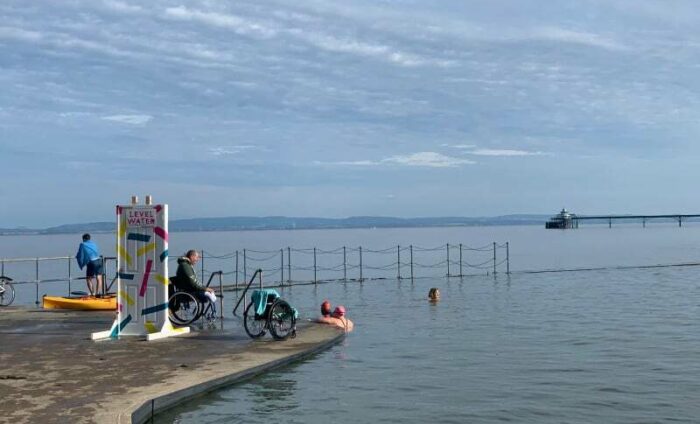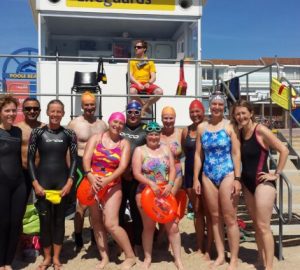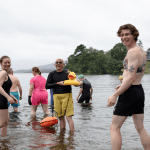
The lido initiatives helping to improve accessibility for swimmers
Emma Pusill reports on the positive changes happening at lidos despite the practical difficulties of increasing accessibility
As you read this piece, the Paralympics and the British team’s stunning achievements – both in the pool and out of it – may be fading to a dim but still glorious memory. As I write, however, the games have only just closed and the memories are bright and vivid. We should all be proud of our para-athletes and the pathway to elite success that has supported them.
But at grass roots things can be different for disabled / adaptive swimmers. It’s indefensible to suggest that disabled people should be barred from accessing swimming venues, but the practical reality is that accessibility is often limited and that does, in effect, bar some people from using them. The Equality Act 2010 makes it a legal responsibility for businesses to show they are taking ‘positive steps’ to remove ‘barriers’ individuals face due to their disabilities. Businesses have to show that they are taking all reasonable steps to improve access and when assessing whether actions to be taken are reasonable factors such as how much resource and finance the business has available can be taken into account.
And those are factors that swimming venues, particularly community-run lidos, can have some difficulty with. Community groups taking on lidos often inherit elderly, even historic pools and buildings that were built in eras when disability rights simply did not exist and public attitudes to disability were, frankly, terrible. Thankfully much has changed since then, in respect of rights and attitudes, but many lidos still wrestle with the practical difficulties of increasing accessibility.
Common access barrier themes identified by disabled swimmers have included:
- Poor access to the venue itself, either by virtue of the swim spot / lido being inaccessible by road and / or having little or no vehicle access or parking, let alone disabled parking bays.
- Poor access within the venue, including narrow passageways, changing levels dominated by steps, ramps installed being too steep for a wheelchair user to self-propel, poorly designed disabled changing / bathrooms
(where they exist at all) and
inadequate lighting.
- Poor access to the pool itself with an absence of steps with handrails and hoists – and where hoists have been installed them either being poorly maintained (and therefore inoperable) and staff not being properly trained in their use, leading to an unsafe and / or undignified experience
for the user.
- Attitudes of staff, with experiences of them actively trying to put off disabled swimmers by focussing on perceived ‘problems’ rather than focussing on ensuring the swimmer’s needs are met.
- Information about accessibility not being clearly set out on websites, making it difficult for disabled swimmers to determine in advance whether a
venue is accessible.
- Online booking systems, many of which have been hastily set up in response to the pandemic, not integrating well with access technology relied on by some visually impaired and
blind swimmers.
But change is happening. Some of it is enabled by restoration and redevelopment, as at Jubilee Sea Pool in Penzance where the huge refurbishment following storm damage saw significant increases to accessibility across the site – it’s now one of the most accessible lidos there is. I visited Jubilee Sea Pool with a wheelchair user friend last year and she rated the facilities very highly – her only complaint was that the plastic free café couldn’t provide her with a straw that was suitable to drink the post-swim cup of tea. Grant holders can play an enormous role by making grants for refurbishment, repair and restoration dependent on improving access.
But some change is also driven by the will and determination to improve access. At Clevedon Marine Lake, an altogether wilder, free to use, tidal pool in North Somerset accessibility is set to improve dramatically with the installation of a hoist and development of a disabled changing facility due to be in place for the 2022 season. One of the lake custodian MARLENS trustees, Hilary Jenkins-Spangler, recognises that a commitment to accessibility is essential for change to take place. She organised a winter-swimming Polar Bear Challenge, which the local swimming community enthusiastically got behind, and the proceeds have gone towards the provision of the hoist. Hilary also highlights that disabled lake users have been invaluable in advising and consulting over the plans to improve access, she said “we have to consult with them – as able-bodied people we can’t just assume that we know best.”
Beccles Lido, in Suffolk, already has excellent provision for disabled swimmers with restricted mobility and it is now actively working on access for disabilities that are less visible. Earlier this year they made the lido available to S14 para-swimmers living with autistic spectrum disorders, Jordan Catchpole and Jessica Jane Applegate, so that they could train ahead of most other pools being open. Applegate won two Bronze individual medals in Tokyo Paralympics and both she and Catchpole were part of the World Record beating Gold Medal 100m freestyle relay team. Beccles Lido are now developing ‘quiet’ sessions where swimmers who may find noise and crowds challenging could have their own lane and can develop a firm routine around that, with a carer / coach poolside.
These are just a few examples of the initiatives to improve access that are taking place around the country, but nobody is under any illusion that more needs to be done. Swim venue operators may be tempted to think there is no demand for increased access because they don’t have any /many disabled swimmers – but the demand is definitely there. The reason these swimmers are not coming is that the access doesn’t meet their needs and that MUST change. The point made by Hilary Jenkins-Spangler can’t be emphasised enough in that respect: change needs to be made in consultation and cooperation with the disabled community. They are, after all, the experts.
The Adaptive / Disabled Open Water Swimmers (ADOWS) Facebook group were hugely generous with their time and experiences when I was researching this article, so thanks to them all for their comments and direct messages.
Emma Pusill is the co-author of The Lido Guide, a celebration of all publicly accessible open-air pools in the UK and Channel Islands








